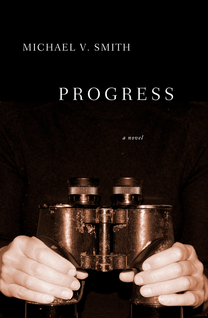 Michael V. Smith Michael V. SmithPhoto by David Ellingsen Michael V. Smith is a writer, comedian, filmmaker, performance artist and occasional clown teaching creative writing in the interdisciplinary program of the Faculty of Creative and Critical Studies at UBC's Okanagan campus in BC's Interior. He is the author of the novels Progress (Cormorant Books 2011) and Cumberland (Cormorant Books, 2002) which was nominated for the Amazon/Books in Canada First Novel Award. In recent years, Smith won Vancouver's Community Hero of the Year Award and the inaugural Dayne Ogilvie Award for Emerging Gay Writers. He's also won a Western Magazine Award for Fiction, scooped two short film prize categories at Toronto's Inside Out festival, and was nominated for the Journey Prize. His videos have played around the world, in cities such as Milan, Dublin, Turin, London, New York, Toronto, Paris, Geneva, Berlin, Glasgow, Lisbon, Beirut, Amsterdam, Copenhagen, Buenos Aires, SF, LA and Bombay. Smith is an MFA grad from UBC’s Creative Writing program. Vancouver Magazine has considered him one of its city's 25 most influential gay citizens whereas Loop Magazine named him one of Vancouver’s Most Dangerous People... His first book of poetry is What You Can’t Have (Signature Editions, 2006), short-listed for the ReLit Prize. In 2008, he published a hybrid book of concrete poems/photographs, Body of Text (BookThug), created with David Ellingsen. RUSTY TALK WITH MICHAEL V. SMITH Kathryn Mockler: What keeps you going as a writer? Michael V. Smith: I’ve always loved a puzzle. My novels have felt like long complicated puzzles that I tried to figure out. Really, every book is a mystery novel, right? You read to the end to find out the whodunnit, in whatever shape that takes. How is this book going to end? Even, how is the poem going to end? How does it work? So writing is the best way to enjoy making puzzles (long ones like novels, short ones like a poem) and still get paid. Okay, I use teaching to get paid. What keeps me going is a fine alchemy of things. There are many pleasures in creating: simple ego-stroking, the thrill of feeling like I’m discovering something, a satisfaction in accomplishment, being generous with myself, the feeling that I’m creating a conversation with someone about a collection of ideas (or characters) I’m very fond of, and the pleasure that comes from being engaged with the world. I’ve never thought of writing as a solitary act. I don’t know where that idea comes from. Writing is a very long one-sided conversation, but I’m always aware that eventually an audience will hear it, and listen, and join in. Kathryn Mockler: What is the revision process like for you? Michael V. Smith: With novels, after I have a first draft, I take out all the parts of the flab that aren’t plot. Just cut it all away. If there are bits of information I particularly like, or can’t do without, then I find somewhere to slip that back in. Usually, that first draft, cleaned up, is a solid skeleton. Then I do drafts that look at fixing specific things: I go through the whole manuscript, for example, and look at tying the events more closely together, so that one event is the cause of what comes next, or I do an edit to ‘psychologize’ the characters, meaning I add in some of the unwritten emotional life of the character, or flush out a bit of background, to fill out our sense of character. It’s a great way to edit for me, because it gives me focus on a particular skill. I always do other work at the same time, of course. One type of change triggers five others. But if I’m just approaching the novel as a whole, it’s overwhelming, and hard to see it clearly, so I love going in there with a tool in hand and digging around, which makes the whole process more manageable. Kathryn Mockler: How did you deal with rejection when you first started out? Michael V. Smith: Rejection is all part of the business, so if you aren’t rejected, you aren’t in the business. I take rejections as a good sign—I’m being a writer. Kathryn Mockler: What are you working on now? Michael V. Smith: I'm working on two projects: a series of tribute videos to friends and family who are ill, and a collection of essays titled Men.  MICHAEL V. SMITH'S MOST RECENT NOVEL Progress, Cormorant Books, 2011 Description Since her fiancé’s death at eighteen, Helen Massey has spent her life avoiding it. Change comes when her town is only months away from being thirty feet under water. A government agency, The Power Authority, is relocating the entirety of her hometown to make way for a power dam project. What can’t be moved will be torn down. Even the cemetery is to be dug up and reinterred nearby. While visiting her lover’s grave, Helen witnesses a man fall to his death on the power dam worksite. “He fell like a sack, straight down, with one arm waving in circles. He fell past the other workman strapped into a harness who must have been surprised to see him pass. Mocking the air. It seemed he fell without a sound.” That same day, her brother returns unannounced after a fifteen-year absence. Robert Massey was a runaway. The construction made his homecoming a “now or never” decision, he tells his sister. “I didn’t want to have to come back in a boat to see the family home.” When Robert discovers his parents kept the reasons for his departure a secret—too little has changed—he confesses, hoping his sister might bury the past. So begins their transformations. The siblings must negotiate their shared history, and their differences, if they are to find themselves a future. In his essay, "A Memoir of Progress," Matthew Rader offers a brief memoir about his experiences with Michael V. Smith's latest novel Progress. This essay is published by AngelHousePress. Read an excerpt of Cumberland. For more information about Michael V. Smith go to his website. Comments are closed.
|
Rusty Talk
Rusty Talk Editor: Archives
November 2017
Categories
All
|

 RSS Feed
RSS Feed
